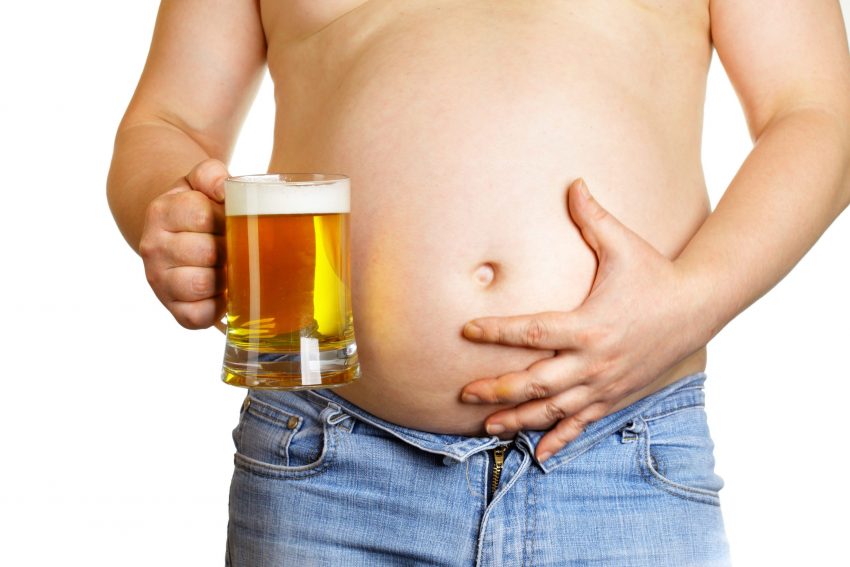
If you’re dealing with alcohol bloating or your face appears full, you may be embarrassed about the way you look and wonder how long it will last. You may wonder how to get rid of alcohol bloat before a big event or to return to work. It’s helpful to understand what causes this bloating, what you can do about it, and how to prevent it in the future.
Alcohol bloat can be a symptom of alcohol abuse or just from drinking too much one time at a party with friends. It doesn’t mean the person is addicted to alcohol, but it often affects those who drink regularly, especially if they have multiple drinks.
What Causes Alcohol Bloating?
Drinking alcohol can lead to bloating in your stomach. The alcohol can cause inflammation, irritating the stomach and causing it to become bloated from a condition known as gastritis. You can also gain weight from drinking alcohol, which might make you look bloated, or have a “beer belly” as it’s commonly called. Generally, these issues only develop with multiple drinks and over a period of time. You may not notice any problems if you only have an occasional drink with dinner or a night out with friends.
How Does Alcohol Make You Bloated?
One of the main causes of stomach bloating is gastritis. This condition is inflammation in the stomach lining caused by an infection, which may be associated with the consumption of alcohol because its inflammatory. The acid in the stomach can cause damage to the lining, which can also lead to stomach ulcers. Symptoms of gastritis include heartburn, nausea and vomiting, abdominal pain, and changes in your appetite along with bloating.
Acute gastritis comes on quickly and will often go away in just a few days. Chronic gastritis takes longer to show up, but it can last for months or even years. Antacids, H2 blockers, and proton pump inhibitors may be prescribed to treat the condition.
Weight gain is another issue with drinking alcohol that may make you look bloated. Many alcoholic drinks are high in calories, such as regular beer and wine. If you have several drinks in one evening, you may end up consuming several hundred calories. Drinking may also cause you to eat more, which leads to even more calories getting into your system.
How long the issue with weight gain lasts depends on how you eat and exercise when you stop drinking. The pounds may come off quickly with a serious regimen or slowly if you don’t make changes in your lifestyle.
Alcohol Face Bloat
Alcohol is inflammatory, which means it can cause swelling throughout the body, made worse when mixed with sugary or carbonated beverages. Alcohol dehydrates your body, which causes the organs to pull water from elsewhere. Dehydration causes the blood vessels to become enlarged. At the same time, you will have water retention as your body counteracts the dehydration, which leads to a puffy or swollen face from the water stored in the tissues.
Alcohol Turning Your Face Red
Along with the puffiness, you may notice that your face gets red after drinking alcohol. If you also feel nauseated and have a rapid heartbeat, you may be having an allergic reaction to alcohol.
To avoid these effects, you should limit the number of drinks or spread them out over a longer timeframe. Eat a meal before drinking and drink a lot of water before, during, and after consuming alcohol. If you feel your face get flushed, you should stop drinking alcohol.
How to Avoid Alcohol Bloat
Not everyone who drinks alcohol will feel bloated or flushed. Drinking alcohol in moderation will eliminate many of these issues as well as following the above steps. Regular or heavy drinkers are more likely to experience these effects of bloating from alcohol than those who are occasional or social drinkers.
If you drink on a regular basis or find yourself drinking more to achieve that “buzz”, you may be suffering from alcohol addiction. Alcohol is a type of drug addiction that can cause damage to your organs, including your liver. Alcohol addiction treatment is available to help you overcome a substance use disorder before you suffer other health problems.
If you have developed a dependence on alcohol, you may notice withdrawal symptoms when you go too long without a drink. These symptoms may include irritability, shaking hands, insomnia, and nausea.
Contact Better Addiction Care for Help with Alcohol Addiction
If you are struggling to overcome an alcohol addiction, you can find help with Better Addiction Care. Whether you’re looking for treatment in California, Massachusetts, or anywhere else in the country, contact Better Addiction Care at (800)429-7690 to learn about the options available. We will answer your questions and verify insurance information to help you find the treatment you need.
Sources:
Bode, C, and J C Bode. “Alcohol’s role in gastrointestinal tract disorders.” Alcohol health and research world vol. 21,1 (1997): 76-83.
Bishehsari, Faraz et al. “Alcohol and Gut-Derived Inflammation.” Alcohol research : current reviews vol. 38,2 (2017): 163-171.
Ready to Get Help?
Let our team of Addiction Counselors help find the Right Rehab for You!
